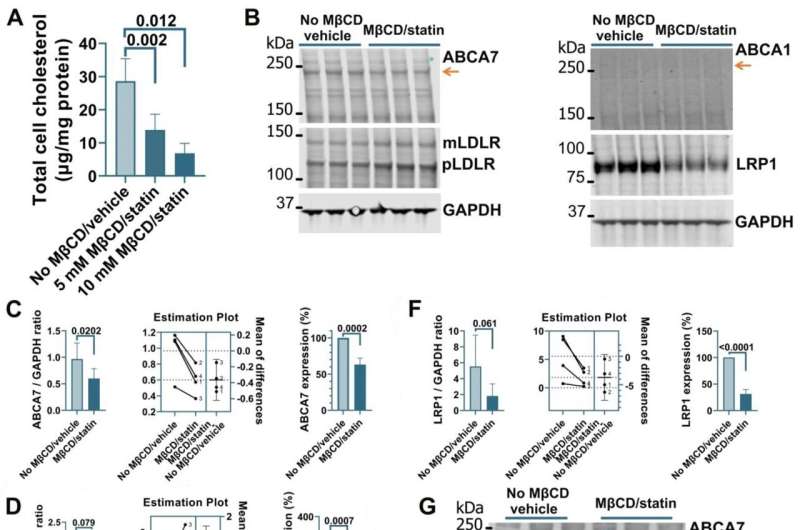This article has been reviewed according to Science X's editorial process and policies. Editors have highlighted the following attributes while ensuring the content's credibility:
fact-checked
proofread
Cholesterol and inflammation demonstrate Alzheimer's link

High cholesterol and chronic inflammation are suspected to increase the risk of developing Alzheimer's Disease; however, these two factors remain poorly understood.
A recent study shows that a protein called ABCA7 plays a functional role as a potential biological link between cholesterol and inflammation in Alzheimer's disease. The new work was published online August 25 in the journal Cells.
With research performed at the Alzheimer's Center at Temple University (ACT), under the leadership of Domenico Pratico, M.D., Director of ACT, and Nicholas Lyssenko, Ph.D., the paper reports on the effects of cholesterol depletion and inflammation on ABCA7, a cellular transporter that regulates the way molecules pass through cell membranes.
The findings demonstrate the sophisticated tuning and regulation of ABCA7 levels during inflammation and reduction of cholesterol availability. The authors suggest that removal of lipids accumulated in neural cells may be a routine action of ABCA7, which, if not performed, can lead to neurodegeneration. Additionally, the study suggests that a loss of ABCA7 in Alzheimer's disease could occur either because of a sudden change in cholesterol, or because of inflammation onset in microglia and astrocytes, which are neuronal supporting cells.
Previous work showed that ABCA7 levels in the brain decline with aging, and mutations that cause a loss of its function are reported in Alzheimer's disease patients. The current study provides new clues on the role of ABCA7 in Alzheimer's disease, suggesting it could be exploited for the development of new treatments.
More information: Joel P. Wiener et al, Down-Regulation of ABCA7 in Human Microglia, Astrocyte and THP-1 Cell Lines by Cholesterol Depletion, IL-1β and TNFα, or PMA, Cells (2023). DOI: 10.3390/cells12172143





















